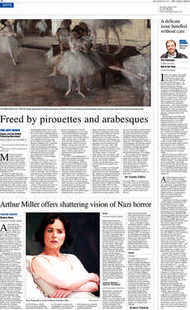Page 12, 30th September 2011
Page 12

Report an error
Noticed an error on this page?If you've noticed an error in this article please click here to report it.
Tags
Share
Related articles
Australians Are Entranced By The ‘mad Monk’
Corrymeela Reconciliation
Sir, — Fund-raising During The Last Two And A Half
A Little-known Fact About `secular' Israel
The Irish In England
It’s becoming hard to find an Aussie priest
Jill, Duchess of Hamilton Notebook
y Irish Catholic grandmother may turn in her grave. “The most common name in the Australian handbook of Catholic priests is no longer Irish, but Vietnamese,” said Fr Adrian Farrelly of Clayfield, in Brisbane. “Yes, we have many overseas priests. My Nigerian deacon here has just been ordained.” One former St Columban priest, Peter Wilkinson, now married with four children in Melbourne, estimates that 20 to 22 per cent of the 1,523 active priests in parish ministries in Australia are on visas or foreign-born – soon it will be one in four. “Sometime between now and 2020 it will reach 50 per cent,” he says. “The average age of priests actively ministering is 62 years – and rising.” In the Diocese of Brisbane there are 142 active priests of whom 13 from Africa or India have arrived in the past five years. They oined dozens of other foreign priests: 14 from Poland and Vietnam and an unspecified number from Italy, the Philippines, Korea, Lebanon, Ukraine, Croatia, Mexico, China and Samoa. In some city parishes they reflect the composition of the congregations.
In the whole of Australia, at least 160 religious Sisters, priests, seminarians, and lay workers arrive annually from Vietnam, India, South America, Nigeria, Uganda and other African countries. Immigration controls mean they are restricted to threeyear labour agreements and visas for ministry, training or study. But patching up the lack of priests with nonEnglish-speaking clerics has received much criticism. Compromises, though, are needed. In the Outback some congregations only have a Mass once a month. Australia had 2,833,438 Catholics and 3,800 priests in 1970. Now the number of Catholics has nearly doubled to 5.6 million, but priests are down to 3,070, including 99 Eastern Rite, eight military chaplains and 16 Opus Dei members.
Some of Australia’s shortfall will be filled by 20 Anglican priests, mostly married, who are converting. The proposed ordinariate in Australia, as in England, is flourishing. Afew mitres may fall off when the bishops read this. The limitations in the Roman Rescript, the process and instrument by which priests are laicised, have been reduced. Old and weary though many of the estimated 100,000 or so priests who have left the priesthood since the 1970s may be, a new clause allows them to be active in churches as laymen.
A Vatican letter says that instead of banishing expriests to the sidelines, bishops may invite them to participate in parish duties. Sent by Cardinal Ivan Dias, recently retired prefect of the Congregation for the Evangelisation of Peoples, to the World Grouping of Catholic Missionary Institutes, it invites “the diocesan bishop to encourage the dispensed cleric to actively participate in the life of the local Church, making all his God-given gifts and talents available for the benefit of the Church”.
Wilkinson, who explains that he has resigned from the ministry, not the priesthood, was among the Australians quietly campaigning for this change. He says that previously the Rescript was “specific and prohibitive: no preaching a homily, no distributing of Holy Communion, no directive role in pastoral work, no functions in seminaries or equivalent institutes, no teaching in tertiary teaching institutions dependent on ecclesiastical authority, no directive or teaching role in formal theological education, and once laicised must keep away from places where formerly known as a priest”.
Will the scarcity of local priests for sacramental and pastoral duties now lead to further concessions?
blog comments powered by Disqus





















